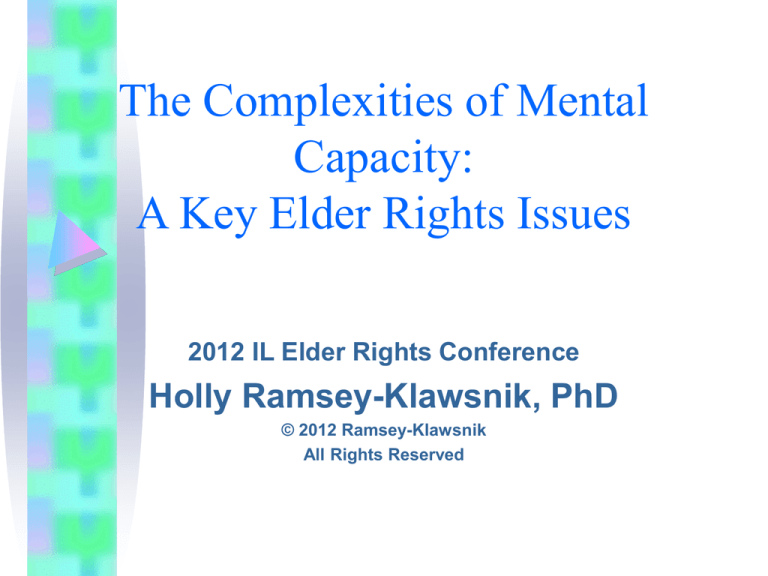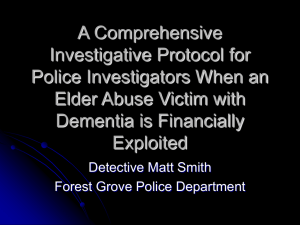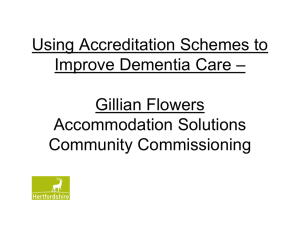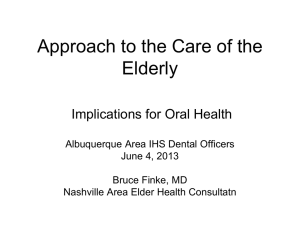
The Complexities of Mental
Capacity:
A Key Elder Rights Issues
2012 IL Elder Rights Conference
Holly Ramsey-Klawsnik, PhD
© 2012 Ramsey-Klawsnik
All Rights Reserved
Discussion
•
•
•
•
Complexities of mental capacity
Challenges in screening capacity
Possible inaccurate assumptions
Role of physical & mental illness,
disability, developmental disabilities,
dementia, neglect and abuse
• Cultural issues
• Gentle, respectful methods for screening
• Using screening tests
Ramsey-Klawsnik Training Materials
2
Mental Capacity
• An evolving clinical and legal
concept
Ramsey-Klawsnik Training Materials
3
Clinically
• An individual
– Has capacity
– Has diminished capacity or
– Lacks capacity
Ramsey-Klawsnik Training Materials
4
Legally
• An individual has or lacks capacity
Ramsey-Klawsnik Training Materials
5
Current Thinking
• Capacities NOT capacity
Ramsey-Klawsnik Training Materials
6
Capacities
• Decisional - ability to make decision
• Executional - ability to execute
• May be able to make decision but not
personally execute
Ramsey-Klawsnik Training Materials
7
Abilities/Domains
•
•
•
•
•
•
•
•
•
Provide medical consent
Consent to APS intervention
Make financial decisions
Manage finances
Engage in contracts/marry
Make a sound will
Drive
Consent to sexual activity
Manage ADLs or IADLs
Ramsey-Klawsnik Training Materials
8
Current Thinking
• Evaluations should assess specific
domains
• Limited court orders only for
impaired domain(s)
• Avoid global descriptions when only
limited impairments
Ramsey-Klawsnik Training Materials
9
Procedures for Assessing
• Interview, observe & interact
• Obtain collateral data
• Formal tests
–
–
–
–
–
–
Functional assessment
Physical exam with lab tests
Psychological, including I.Q.
Neuropsychological
Medical tests of brain functioning
Psychiatric
Ramsey-Klawsnik Training Materials
10
Concerns
Capacity lack may be temporary
Neglect/abuse can decrease capacity
Disability can mask capacity
Brief, crude testing can be harmful
Ramsey-Klawsnik Training Materials
11
Between a Rock & a Hard Place
•
•
•
•
•
•
APS workers expected to assess/screen
Not able to determine capacity
Critical decisions hinge on capacity
Difficult to obtain formal testing
“Quickie” tests can lead to false readings
Problems with 1x assessment
Ramsey-Klawsnik Training Materials
12
Mental Illness & Capacity
• Most with dx MI have capacity
• Major MI can cause psychosis &
temporary incapacity
• Effect of psych meds + or -
Ramsey-Klawsnik Training Materials
13
Case Example
• Does this woman lack capacity?
• What is the evidence that she does
or does not have capacity?
• How would you further assess?
Ramsey-Klawsnik Training Materials
14
Mrs. T.
• Police referred “harmless but
deranged” 79 yo widow to APS,
repeat “nuisance calls”
• Lives alone – children out of area
• Calls police: “invaders” in her attic
• No heat due to no gas
Ramsey-Klawsnik Training Materials
15
Mrs. T.
•
•
•
•
•
•
•
•
Owned home in middle-class area
Home clean, well-maintained
Has raised 4 kids, worked in office
Independent in ADLs & IADLs
Hygiene good, memory intact
Drives, does errands
Adamant little people in attic stealing
Appeared paranoid, delusional
Ramsey-Klawsnik Training Materials
16
Physical Disability & Capacity
• Many with physical disabilities
mistaken as incapacitated
• CP, MS, Parkinson's Disease, Lou
Gehrig Disease (ALS), aphasia
• Case example: Harold, has CP
Ramsey-Klawsnik Training Materials
17
Need with Physical Disabilities
•
•
•
•
Communication remedies
Time, observation, interaction
Background & collateral info
May need specialists to assess
Ramsey-Klawsnik Training Materials
18
Disease/Injury
•
•
•
•
Illness and treatment affect capacity
Infections, fluid in lungs, etc.
Meds can alter cognition
Post-surgery or trauma NOT time to
assess capacity
Ramsey-Klawsnik Training Materials
19
Mrs. N.
•
•
•
•
•
•
74 y.o. independent widow
Fell, broke hip, surgery resulted
MD used MMSE one day post-op
Mrs. N. failed
MD diagnosed & charted dementia
Outcome…
Ramsey-Klawsnik Training Materials
20
Developmental Disabilities
•
•
•
•
Include intellectual disabilities
I.Q. of 70 or below
Many with DD have capacity
Specific testing required
Ramsey-Klawsnik Training Materials
21
Dementia & Capacity
•
•
•
•
Dementia typically progressive
Capacity retained early-mid stages
Abilities tend to fluctuate
Need multiple reads at various times
Ramsey-Klawsnik Training Materials
22
Dementia Diagnosis Requires
• Multiple cognitive deficits, including memory
impairment
• Gradual onset
• At least one of:
– Aphasia – language disorder
– Apraxia – motor impairment
– Agnosia – failure to recognize items
• Disturbance in executive functioning
– Planning
- organizing
– Sequencing
- abstracting
• Must be decline & severe impairment
Ramsey-Klawsnik Training Materials
23
Caution re: Dementia Dx
• Dementia dx should not be
interpreted as person not accurate
reporter
• Abuse & neglect disclosures should
NOT be discredited d/t dementia
Ramsey-Klawsnik Training Materials
24
Neglectful Care
• Can profoundly affect cognition
–
–
–
–
–
–
Malnutrition
Dehydration
Untreated illness, infection
Lack of sleep
Over- under-medication
Isolation
• Much caution needed in assessing
Ramsey-Klawsnik Training Materials
25
Case: Mr. W.
•
•
•
•
•
Arrived at ER in poor condition
Disclosed abuse & neglect to nurse
APS report made
Admitted then displayed confusion
Disclosures dismissed, dementia
diagnosed
• Transferred to LTC
• Outcome…
Ramsey-Klawsnik Training Materials
26
Abuse & Capacity
• Diminished capacity increases abuse risk
• Abuse can cause cognitive problems
– Illness, injury, trauma, loss, etc.
• Cognitive limitations can result in being
discredited when report actual abuse
Ramsey-Klawsnik Training Materials
27
Deliberate Interference
• Abuser may hinder victim abilities to
exploit
• Over, under-drug, isolate, disorient,
deny adaptive devices
Ramsey-Klawsnik Training Materials
28
Case: Lady From Georgia
•
•
•
•
•
•
•
Moved to Ohio at son’s urging
There, imprisoned in his home
Isolated, exploited, abused, neglected
Drugged,presented as self-neglecting
Crude assessment by MDs
Son obtained guardianship
FE, neglect, abuse increased
Ramsey-Klawsnik Training Materials
29
Screening Capacity
• Clinically complex, especially when
– Abilities fluctuate
– Communication barriers exist
• Limitations with brief tests
• Impact on client and rapport
• Risk of false positive/negatives
Ramsey-Klawsnik Training Materials
30
Consider
• When assessing cognitive abilities…
Ramsey-Klawsnik Training Materials
31
Culture & Language
• Culture, speech & language of both
client and tester impact test accuracy
Ramsey-Klawsnik Training Materials
32
Consider
• Am I seeing client at his/her worst?
• Am I seeing client at his/her best?
• Is the functioning typical?
Ramsey-Klawsnik Training Materials
33
Consider - Is Client
Hungry, thirsty, sick, drugged, sleep
deprived, fearful, in pain or crisis,
grieving, acutely anxious,
preoccupied?
Ramsey-Klawsnik Training Materials
34
If Person Not at Baseline
• Functioning below normal displayed
• Cognitive assessment inappropriate
• Intervention may be needed
Ramsey-Klawsnik Training Materials
35
Consider:
•
•
•
•
Have I build rapport?
Have I explained my role?
Have I sought consent?
Am I communicating clearly?
Ramsey-Klawsnik Training Materials
36
Consider:
•
•
•
•
•
Is situation conducive to assessing?
Physical conditions
Privacy
Safety
Are there urgent unmet needs?
Ramsey-Klawsnik Training Materials
37
Key
• Observation and interaction over
time necessary to fully assess esp.
when disabilities exist
• Also need reliable history
Ramsey-Klawsnik Training Materials
38
Use Collateral Data
•
•
•
•
Beware tainted reports
Obtain multiple opinions
Obtain basis for opinions
Records may be inaccurate
Ramsey-Klawsnik Training Materials
39
Testing
• No standard test battery for evals
• Must select appropriate tests
• APA/ABA urge: “functional
assessments that describe taskspecific deficits”
Ramsey-Klawsnik Training Materials
40
Evaluation Problems
• Many clinicians not trained to test
functional & cognitive ability
• Testing that is too brief or crude
• Using the wrong measures
• Relying upon false data
• Language/communication barriers
• Testing client in crisis or distress
• Global conclusions from limited data
Ramsey-Klawsnik Training Materials
41
Natural Assessment
• Observe, interview, interact
• Observation and open-ended
questions best practice
Ramsey-Klawsnik Training Materials
42
Natural Opportunities
• Observe person & environment
• Does appearance suggest A&O?
• Clues in client’s environment
Ramsey-Klawsnik Training Materials
43
Natural Opportunities
• Gentle, non-threatening conversation
• Can client converse?
– Understand what is said
– Process & hold thoughts
– Formulate responsive answers
• Assess memory through asking history
• Use environmental clues
– Photos, hobbies, abilities, needs, habits
Ramsey-Klawsnik Training Materials
44
Other Opportunities
• Client sign & date forms
• Observe client do task
– Are steps planned?
– Is behavior meaningful?
– Is desired goal reached?
Ramsey-Klawsnik Training Materials
45
Questions When Tests Used
• Is tool validated, normed,
standarized, acceptable measure?
• Is tester qualified, trained &
experienced to administer & score
this test, authorized to use?
• Is tester in a role in which testing is
appropriate?
Ramsey-Klawsnik Training Materials
46
Testing Questions Con’t
• Is elder in situation in which he/she
can perform up to ability?
• Has tester built rapport, used
conversation to engage and assess,
obtained background info &
permission to test?
Ramsey-Klawsnik Training Materials
47
Testing Questions Con’t
• Has effective communication been
established between tester & elder?
• Is there clear purpose & reason for
the test?
• How will the results be used?
Ramsey-Klawsnik Training Materials
48
Summary
• Use great caution in drawing
conclusions re: mental capacity
• Consider:
– Conditions under which capacity tested
– How tested
– Possible ulterior motives
• Assess at multiple times, use
multiple methods
Ramsey-Klawsnik Training Materials
49
Do
• Observe & document client statements,
appearance, behaviors, environment,
abilities
• Avoid rash conclusions
• Avoid statements re: cause of problems
• When capacity in question, seek quality
formal evaluation
• Advocate for clients unfairly judged
Ramsey-Klawsnik Training Materials
50
Thank you!
• And Good Luck in serving elders!
Ramsey-Klawsnik Training Materials
51












